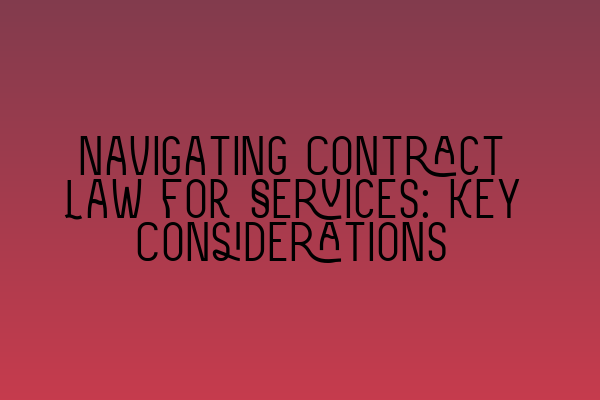Navigating Contract Law for Services: Key Considerations
As a solicitor specializing in contract law for services, I understand the importance of having well-drafted and carefully negotiated agreements in place. Contracts play a vital role in protecting the rights and interests of both parties involved in a service-based transaction. In this blog post, we will explore some key considerations when navigating contract law for services, giving you the tools you need to ensure a smooth and successful business relationship.
1. Clear and Concise Definitions
One of the fundamental aspects of any contract is the definition section. It is crucial to clearly define the terms and phrases used throughout the agreement to avoid any confusion or misinterpretation. By providing specific and unambiguous definitions, both parties can have a mutual understanding of their rights and obligations.
2. Scope and Deliverables
When entering into a service agreement, it is essential to define the scope of work and deliverables in detail. Clearly outlining what services are to be provided, along with any specific expectations or requirements, will help prevent disputes down the line. Make sure to include any milestones or deadlines to ensure timely completion of the project.
3. Payment Terms and Conditions
The financial aspect of a service agreement is typically one of the most significant concerns for both parties. Clearly define the payment terms and conditions, including the amount, frequency, and method of payment. It is also essential to address any additional costs, such as expenses or taxes. By being transparent about financial matters, you can minimize the risk of payment disputes.
4. Termination and Liability
No matter how well a business relationship starts, sometimes it becomes necessary to terminate the contract. Include provisions that outline the conditions under which either party can terminate the agreement, as well as the consequences of termination, such as any financial obligations or intellectual property rights. Additionally, consider including limitation of liability provisions to protect both parties from excessive financial risk.
5. Dispute Resolution Mechanisms
Should a dispute arise, it is crucial to have a mechanism in place for resolving it efficiently and cost-effectively. Consider including alternative dispute resolution (ADR) clauses in your contract, such as negotiation, mediation, or arbitration. These processes can often provide a faster and more collaborative resolution compared to traditional litigation. Exploring Alternative Dispute Resolution: An Effective Approach to Legal Conflicts provides further insights on this topic.
6. Intellectual Property Rights
In service-based contracts, intellectual property rights are often a critical consideration. Clearly outline who will retain ownership of any intellectual property created during the provision of services. This may include patents, trademarks, copyrights, or trade secrets. It is essential to protect your intellectual property and ensure compliance with relevant laws and regulations.
7. Governing Law and Jurisdiction
Determining the governing law and jurisdiction can have significant implications if a dispute arises. Clearly specify which laws will govern the contract and which courts or arbitration tribunals will have jurisdiction over any disputes. Careful consideration should be taken regarding the applicability and enforceability of these provisions, especially when dealing with international or cross-border transactions.
Remember, these are just some of the essential aspects to consider when navigating contract law for services. Every situation is unique, so it is essential to seek personalized legal advice to ensure your specific needs are met. Mentorship for Aspiring Solicitors: Nurturing Talent in the Legal Field and Mentorship for Aspiring Solicitors: Finding Guidance on Your Legal Journey can provide further guidance on finding the right mentor to enhance your legal skills.
In conclusion, having a well-drafted service agreement is crucial for both service providers and their clients. By carefully considering and addressing these key considerations, you can ensure a smooth and successful business relationship. The Art of Contract Drafting and Negotiation: Skills Every Solicitor Should Master offers valuable insights into the art of contract drafting and negotiation. Remember, legal challenges and pitfalls can arise, so it is essential to navigate the complexities of the legal system with confidence. Legal Challenges and Pitfalls: Navigating the Complexities of the Legal System provides additional guidance on this topic.
If you are in need of professional assistance or further guidance on contract law for services, do not hesitate to contact us at SQE Contract Law. Our team of experienced solicitors is here to help you navigate the intricacies of contract law and ensure the protection of your rights and interests.
